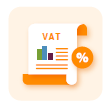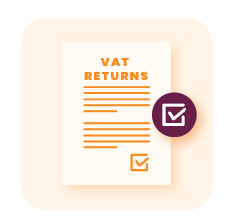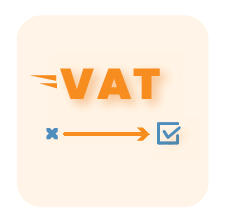VAT Registration in Austria
Individuals or entities that are liable to pay VAT in Austria are required to register for a VAT identification number (VAT ID), except in cases where exemptions apply. Those who only carry out transactions that do not grant the right to a VAT deduction, such as exempt transactions under Section 6 of the Austrian VAT Act, are not obligated to register for VAT.
Read all about VAT registration in Austria in our comprehensive guide below.
Selling in Austria?
Registration exemptions in Austria
Group and Divisional Registration
Under Austrian VAT regulations, a group of two or more domestic companies or partnerships known as “Organschaft” must be combined for VAT purposes if one entity controls the others, or if they are all under common control and have either registered or principal offices located within Austria. This grouping is mandatory according to Section 2(2) of the VAT Act.
Registration, Generally
To register for VAT in Austria, taxpayers must submit a paper application to the relevant tax authorities. The competent authority depends on the location of the business; for Austrian residents, it is usually the tax office in the city or area where the business is located. Non-resident taxpayers must register with the tax office in Graz-Stadt.
Austrian taxpayers who are eligible for a VAT identification number (VAT ID) will automatically receive it when applying for a general tax number using forms such as “Verf15,” “Verf26,” and other necessary documents. On the other hand, non-resident taxpayers need to submit forms such as “Verf19,” “Verf26,” and “U70” to complete their registration process.
Taxable persons
In Austria, a person who conducts business and supplies goods or services within the country is considered a taxable person for VAT purposes. The term “persons” encompasses both natural persons and legal entities. This includes individuals or entities who engage in ongoing business activities independently, with the intention of making a profit.
These individuals and entities are referred to as “entrepreneurs” or “enterprises” according to Section 2 of the VAT Act. However, services provided by an employee during their employment are not considered an independent economic activity.
VAT Representatives
If a business operating in the EU or Norway sells goods or services that are subject to VAT in Austria, they can choose to appoint a fiscal representative to handle their Austrian VAT-related affairs. However, if the business is based outside of the EU or Norway, they are typically required to appoint a fiscal representative. The fiscal representative acts as the foreign business’s representative and is responsible for fulfilling all the VAT obligations on their behalf.
While the fiscal representative is responsible for complying with VAT requirements on behalf of the foreign business, they are not personally liable for paying the VAT owed. However, they do share joint and several liability with the foreign business for fulfilling their VAT obligations.
Distance Sales
Businesses that sell taxable goods to non-business customers in Austria through remote means are subject to special registration and tax rules. If the business is in another EU country and their sales to Austrian customers exceed a certain threshold, they must register for Austrian VAT. If the sales do not exceed the threshold, the business can still choose to register and pay Austrian VAT.
As of July 1, 2021, distance sellers within the EU and sellers of low-value goods from outside the EU can take advantage of the simplified registration process offered by the EU’s One Stop Shop (OSS) program.
Last Updated: 11/10/2023
Disclaimer
The information provided by Global VAT Compliance B.V. on this webpage is intended for general informational purposes only. Global VAT Compliance B.V. is not responsible for the accuracy of the information on these pages, and cannot be held liable for claims or losses deriving from the use of this information. If you wish to receive VAT related information please contact our experts at support@gvc.tax








